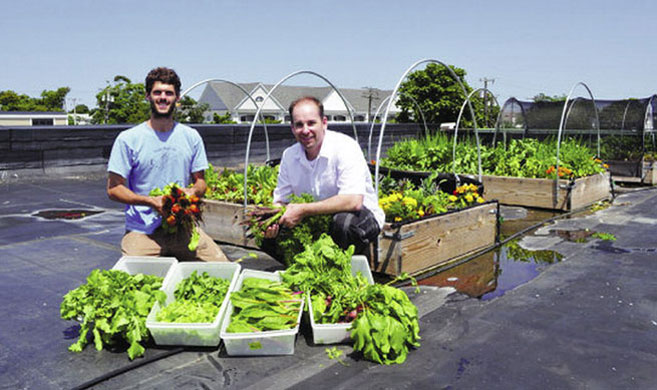Edible Landscapes
Taking Root
When Julie Davis and Dave Scandurra dine out, they do just that: walk out their front door to harvest a meal. The pair debuted their business, Edible Landscapes, just over a year ago based on the mission that the more of the landscape that you can eat, the better. Score bonus points if those plantings are perennial. Ideally one should only stroll one’s property to find vegetation that is tasty, healthy and sustainable.
Operating from Scandurra’s childhood home in West Barnstable, the two are slowly creating the environment they envision. Pleased to support them, Scandurra’s mom is thumbs-up (green, of course) on the transformation. A wooden-framed greenhouse has been erected, and a long rectangular bed of vegetables and edible perennials as well as an herb spiral have been planted.
Last spring Scandurra posted a tour of his property as a Meetup event to share his vision and initial planting efforts. Julie Davis attended to learn about his projects and they discovered their shared history. Not only did the two spend some of their childhood in Scandurra’s West Barnstable neighborhood only blocks apart, Davis was equally passionate about all things botanical and agrarian. Plus, the two had worked for the same Virginia farm at different times.
Davis’ family moved off Cape to live in Scituate for several years, but recently returned. Following a traditional education, she experienced hands-on farming locally, working with Tim Friary and his crew at Cape Cod Organic Farm in Barnstable. Further afield, she took a position at the Southern Exposure Seed Exchange in Virginia, adapting and harvesting seeds from different varieties of nightshades and herding some of their goats.
Scandurra’s penchant for growing was influenced by his brother, a naturalist passionate about trees and plants, as well as his own affinity for foraging food in the wild. Genetics play a role too, as his grandfather and uncle both farmed.
Returning to his boyhood home, on acreage that includes a small pond possibly used to irrigate the land when potatoes were farmed there, Scandurra saw an edible opportunity. “The soil was good,” he says, grinning, “and my mom was cool with it.”
Edible Landscapes’ belief is that as much as possible of our surroundings should be perennial agriculture. “We want to achieve a permaculture that is efficient, ecological and contains polycultures instead of monocrops—polycultures being groups of plants or guilds that support one another. The goal is a self-sustaining system that is low maintenance,” says Scandurra. “It needs to happen here as it already has begun on the west coast, where they are fusing farming with landscaping.”
Despite the challenge of starting a business, and one with a novel approach at that, the pair is upbeat, focused and in it for the long haul. They’ve worked at spring garden installations, straight-up garden reclamation, and raised bed construction and installations as they’ve waited for edible landscaping jobs. The word is out and slowly the projects are coming their way.
Edible Landscapes has transformed the ornamental landscape of the Harvest Gallery Wine Bar in Dennis into a working kitchen herb garden. They have worked to convert clients’ wooded areas into integrated permaculture gardens by planting raspberries, blueberries, elderberries, winterberries and gooseberries amongst pre-existing native wood plants and trees. They also maintain the rooftop garden of Pizza Barbone smack in the middle of Main Street, Hyannis.
Unusual too is Edible Landscapes’ commitment to being a worker-owned cooperative, actively seeking out people who wish to be a part of this type of business model. Their vision includes establishing a non-profit branch that will bolster the education work they can do. “We’d like to bring quality food and edible gardens to schools, nursing homes, food banks, shelters, and the like,” says Scandurra.
Already Edible Landscapes has experience working in two public schools: Hyannis West Elementary and Barnstable United. Last spring they ran a three-month grant-funded after-school program for a group of thirty kids from grades one through five at each school. They grew edibles using mobile light boxes and created window boxes. “We’re going to fine tune it and make it even better this year,” promises Scandurra.
One book in particular that has changed their outlook forever is Perennial Vegetables: From Artichokes to Zuiki Taro. Some of the plants that Edible Landscapes utilizes are alpine strawberries, albino strawberries (that look unripe but are ready), parsnip, chamomile, anise hyssop, Turkish rocket, lambs ear, lovage, bee balm, sorrel, fennel and perennial arugula, kale and spinach. One day an Edible Landscapes wild greens CSA may appear, incorporating some of the greens we overlook, like dandelion, stinging nettle and purslane.
Hearing Scandurra and Davis spout off dozens of common and Latin names while we tour their property, one wonders how the two recall all the varieties of plants. Scandurra smiles, “I sleep with the books under my pillow.”
Davis, Scandurra, his mom, and their recent clientele all walk the walk. Why sit on your lawn when you could munch? Challenge yourself to grow some food by replacing just a bit of your traditional landscaping, and then dine on your successes.
As the Edible Landscape homepage proclaims, “Have your yard and eat it too!”
Edible Landscapes
774.994.0333
Writer Michelle Koch lives in Orleans with her daughters Chloe and Camille and their dog Woof. When not working with Nauset Middle School eighth graders, she grows a big flower, herb and berry garden every summer. Michelle is delighted to learn that perennial rue prevents mice, and is planting lots of it near her doorways in hopes of avoiding the few that always join her for the winter.





